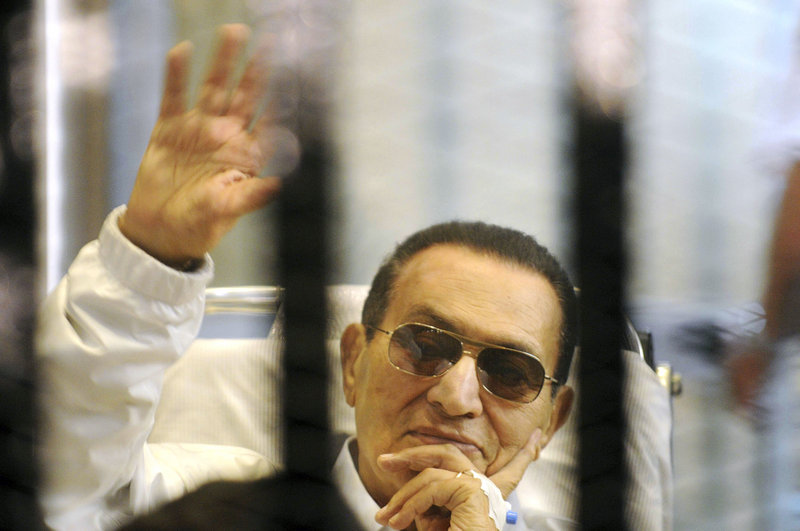CAIRO —
A Cairo court ordered ousted President Hosni Mubarak freed from prison, a move that could complicate Egypt’s increasingly violent political transition, while militants in Sinai killed 26 policemen.
The Cairo criminal court’s order to free Mubarak threatens to inject new tensions in a nation convulsed by unrest that has killed almost 1,000 in the past six days. His potential release may spur arguments by the Muslim Brotherhood and others locked in a standoff with the government that the military-installed leaders want to restore the kind of police state Mubarak led.
The military removed Brotherhood-backed President Mohammed Morsi on July 3 following days of rallies against him, a move that has sparked near-daily protests by his backers that have frequently boiled over into deadly clashes. The tumult has made it even more difficult for Egypt to emerge from the slowdown that has battered the economy since Mubarak was toppled.
“No doubt there’s a willingness from some elements of the former regime of Mubarak to come back to the Egyptian political landscape,” said Nasser Amin, director of the Arab Center for the Independence of the Judiciary and the Legal Profession. “This doesn’t mean a return of the police state, those who participated in the Egyptian revolution won’t allow that.”
Morsi has been in military custody since his removal. He was ordered held Monday for 15 more days pending a probe into new claims he incited violence during deadly unrest in December.
Mubarak, ordered freed in connection with a corruption case, could be released within three days, his attorney, Farid ElDib, said by phone Monday.
ADDITIONAL LAWSUITS
He has already been ordered released in connection with two other lawsuits for which he has been jailed, including his role in the deaths of protesters during the 2011 uprising against him. Another case involving gifts from the state-run Ahram group must be decided before he can be freed, Mahmoud el-Hefnawy, an official with the prosecutor general’s office, said by phone.
Mubarak is being retried in the protester deaths case after his life sentence was overturned on appeal.
Youth activists from the group that drove the campaign to oust Morsi said the autocratic leader who ruled Egypt for 29 years won’t be allowed to govern again.
“The fact that we’re fighting the Brotherhood doesn’t mean we’ll allow the return of the Mubarak regime, simply because both regimes are two sides of the same coin,” said Islam Hammam, a leader of the Tamarod group.
The court ruling comes at a difficult time for the government. International censure has mounted since it cleared out two pro-Morsi protest camps in the Cairo area on Aug. 14, touching off a cycle of violence from which the country has yet to emerge.
About 900 civilians and 100 policemen have died since the camps were stormed.
In Sinai Monday, militants armed with rocket-propelled grenades killed 25 policemen near the border with the Gaza Strip. The Interior Ministry, in an e-mailed statement, described the incident as a “continuation of the terrorist crimes in Sinai.”
LAWLESSNESS INCREASES
Another officer was shot dead by a rooftop sniper near the city of al-Arish, the ministry said. The peninsula has grown increasingly lawless since Mubarak was pushed from power, and militants operating there have stepped up their attacks on police and soldiers since Morsi’s overthrow.
Interim President Adly Mansour met with Defense Minister Abdel-Fatah el-Sissi and Interior Minister Mohamed Ibrahim to discuss the situation in Sinai, the presidency said in a statement.
Hours earlier, at least 36 Muslim Brotherhood members were reported killed during what the Interior Ministry said was an attempt to escape from custody while en route to prison.
The cabinet said in a statement that security forces responded after prisoners took a police officer hostage. There was no way to reconcile the reports.
El-Sissi, who led Morsi’s ouster last month, warned Sunday that the military won’t “remain silent before the destruction of the country.”
He also urged Islamists to participate in the government’s plan to steer Egypt toward a civilian democracy.
“By launching the attack just hours after el-Sissi’s speech, in which he promised to end violence in Sinai, the Brotherhood and their allies in Sinai are trying to challenge the army and send a message that they don’t care about his remarks,” said retired army general Sameh Seif el-Yazal.
Send questions/comments to the editors.



Success. Please wait for the page to reload. If the page does not reload within 5 seconds, please refresh the page.
Enter your email and password to access comments.
Hi, to comment on stories you must . This profile is in addition to your subscription and website login.
Already have a commenting profile? .
Invalid username/password.
Please check your email to confirm and complete your registration.
Only subscribers are eligible to post comments. Please subscribe or login first for digital access. Here’s why.
Use the form below to reset your password. When you've submitted your account email, we will send an email with a reset code.